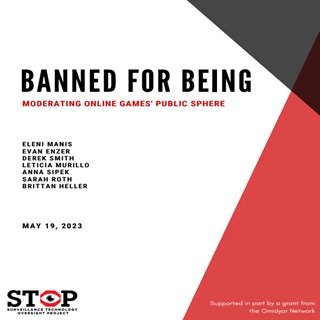By Eleni Manis, Evan Enzer, Derek Smith, Leticia Murillo, Anna Sipek, Sarah Roth, Brittan Heller
Online gamers aren’t just playing games: they’re joining lively public forums that reflect offline civil society with both its good and its evils.
Game companies moderate content to promote civility in these forums, but they frequently make bad calls against historically marginalized gamers. These gamers get “banned for being” when they assert their identities and “banned for responding” when they reply to harassment by standing up for themselves.
Games can begin to combat repeated bad calls against historically marginalized gamers—which amount to structural discrimination in online games—by offering robust notice and appeals systems.
But to build truly inclusive public forums, games must also change the rules of moderation. Games must consider gamers’ words in context to avoid penalizing historically marginalized gamers for asserting their identities or for responding to hate. They must carefully limit any rules against political and controversial speech to avoid forcing historically marginalized gamers off of gaming platforms.



